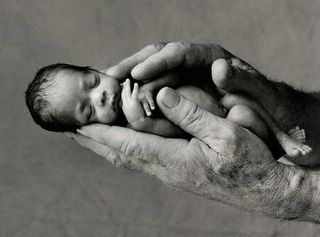“Please come close and kiss me, my son.”
(Genesis 27:26)
“In the Scriptures, touch played an important part in the bestowal of the family blessing. When Isaac blessed Jacob, an embrace and a kiss were involved.
The Hebrew word for “come close” is very descriptive. It is used for armies drawn together in battle. It is even used to picture the overlapping scales on a crocodile’s skin.[i] It may have been a while since you last saw a battle or a crocodile, but these word pictures still call up in our mind a picture of a very close connection.
Isaac wasn’t asking his son to give him an ‘Aunt Ethel hug.’ (Remember Aunt Ethel – the one who pinched your cheek and then repeatedly patted you on the back when she hugged you like she was bringing up gas?) Free of the current taboos our culture sets on a man embracing his son, Isaac was calling Jacob close to give him a bear hug.
This hug is even more special because Jacob was not four, but at least forty years old; and he was still encouraged to give his dad a hug and a kiss.[ii] As we have seen, our need for meaningful touch does not go away when we enter grad school. And yet, it should be noted that,
‘Even in caring homes, most parents (particularly fathers) will stop touching their children once the children reach the grade school years.’[iii] When they stop touching them, an important part of giving their children the blessing stops as well.[iv]
Smalley and Trent point out some additional qualities and benefits of meaningful touching in their book The Blessing.
Every day, researchers are discovering more and more information about the importance of touch. If we are serious about being a source of blessing to others, we must consider and put into practice these important points.
Some nursing homes and animal shelters can be havens of despair, not places of hope. Residents in both can be isolated and alone. Residents in either can spend hours dreaming and longing for a family or friends; and in many cases, the loneliness in an older person’s heart can be just as confining as the bars that forsaken animals live behind.
Thankfully, some nursing homes and animal shelters seek to meet their residents’ needs. Almost by accident, residents of a nursing home and a local animal shelter were brought together. At first, it was just thought of as a recreational activity for the nursing home patients. Soon, however, more significant results began to surface. Those residents who had a pet to touch and hold not only lived longer than those without, but they also had a significantly more positive attitude about life.[v]
What brought about these physical changes? Studies show that touching can actually lower a person’s blood pressure. Low blood pressure is an important part of staying healthy. But that’s not all. In a recent study at UCLA, it was found that just to maintain emotional and physical health, men and women need eight to ten meaningful touches each day![vi][vii]
q Can you recall a life significant and meaningful experience embracing another?
o What was the setting? What happened?
q What did touch look like in your home growing up?
q What does it look like in your home today?
o What reflections do have about that?
A free-lance reporter from the New York Times was interviewing Marilyn Monroe years ago. She was aware of Marilyn’s past and the fact that during her early years Marilyn had been shuffled from one foster home to another. The reporter asked Marilyn, “Did you ever feel loved by any of the foster families with whom you lived?”
“Once,” Marilyn replied, “when I was about seven or eight. The woman I was living with was putting on makeup, and I was watching her. She was in a happy mood, so she reached over and patted my cheeks with her rough puff…For that moment, I felt loved by her.”[i]
Relationships Keep Us Alive
Single men are jailed more often, earn less, have more illnesses and die at a younger age than married men. Married men with cancer live 20% longer than single men with the same cancer. Women, who often have more close friendships than men, survive longer with the same cancers. Married or not, relationships keep us alive.[ii]
[i] Helen Colton, The Gift of Touch, New York: Seaview/Putnam, 1983, 29.
[ii] Dr. Bernie Siegel, in Homemade, May, 1989.
[i] Job 41:15-17; also see Brown, Driver, and Briggs, 621.
[ii] In Genesis 26:34 we are told that Esau was “forty years old” when he married. Since Jacob was his twin brother, it would naturally follow that he too was at least forty years old at the time of the blessing.
[iii] K. M. Banham, "The Development of Affectionate Behavior in Infancy," Journal of Genetic Psychology,1979, vol. 76: 283-89.
[iv] Ibid. 40-41.
[v] F. B. Dresslar, “The Psychology of Touch,” American Journal of Psychology, vol. 6, 1984, 316.
[vi] UCLA Monthly, Alumni Association News, March-April 1981, 1.
[vii] Ibid., Smalley & Trent, 45-46.



No comments:
Post a Comment